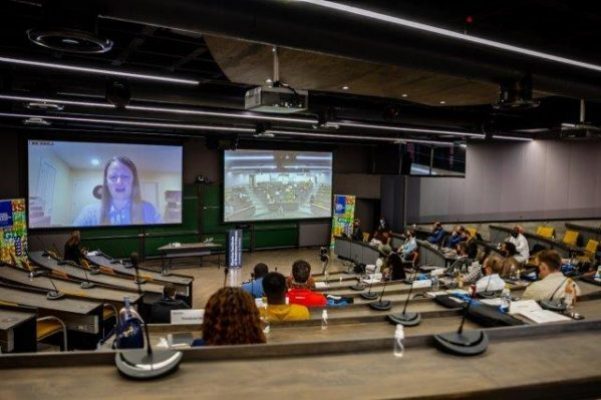AGCO Agriculture Foundation Director Metti Richenhagen addressing the AAQ cohort participants
The AGCO Agriculture Foundation (AAF) skills development initiative, under the banner of ‘Advancement in Agricultural Education’, saw 20 deserving participants commence with the Africa Agribusiness Qualification (AAQ) on 1 September. This took the form of an introductory session at the Gordon Institute of Business Science (GIBS) Johannesburg campus elaborating on the programme content and anticipated outcomes.
Fully-funded by the AAF and implemented through the AGCO Africa Head Office in Johannesburg, the AAQ programme is facilitated by GIBS, together with Harper Adams University in the UK. Furthermore, technical expertise and support are provided by AGCO South Africa and Cerealis Technology Institute in South Africa.
“The AAQ is a well thought-out, one-of-a-kind programme that seeks to fill a much-needed capacity or skills gap in agribusiness in Africa,” comments AAQ Program Manager Dr. Benard Ngwene. It includes an accredited management qualification (NQF4) and provides participants with business, agronomy and technical skills to enable them progress in their careers and/or better manage their businesses. “The AAQ programme will continue to evolve in response to the agri-industry’s training needs,” adds Dr. Ngwene.
About 270 applications were received over a two-week application period. The two-stage selection process saw applicants longlisted based on set criteria. Shortlisted candidates were invited for an online interview, following which the 20 most deserving were chosen. The selection process took into account factors such as group dynamics and learner abilities, so as to ensure all participants will not only benefit from the programme curriculum, but also be able to share their unique experiences through peer-to-peer learning. Participant capabilities will be gauged at an in-depth level during the programme to understand how best to magnify their strengths, while identifying and working on improving any areas of weakness.
This is actually the second AAQ cohort. The initial 24-month programme was hosted in Kenya from March 2018 to March 2020 and was open to participants from all over Africa. To cushion against any uncertainties posed by Covid-19, such as the restriction of movement between countries, the 2021 AAQ call for applications was open to South African residents only. This included other African nationals living in South Africa. The AAQ programme will be implemented through a hybrid model, with 80% online delivery and 20% face-to-face classes.
Dr Ngwene highlights that the AAQ programme aims to:
- Cultivate agricultural professionalism and quality leadership.
- Enhance knowledge of the African agri-entrepreneurship ecosystem.
- Build participants’ capacity to achieve sustainability in food systems and agribusinesses.
- Inspire innovations that strengthen Africa’s production systems.
- Enhance knowledge of agricultural science, agribusiness and mechanisation.
- Enhance the ability of participants to develop and implement projects, initiatives and businesses in various agricultural value chains.
- Increase exposure to platforms through which participants can contribute to policy discussions and programmes that aim at strengthening African agriculture.
- Produce competent graduates with the capacity to deliver effectively in junior management, technical and specialist roles in agricultural-based companies.
The 2021 AAQ cohort participants will take courses across agronomy, business, sales and marketing, as well as technical training. The programme is structured as six core modules and two electives. The course offering and design was informed by recommendations and consultations with industry players and various stakeholders. All the implementing partners are renowned industry leaders offering quality training and education in their various fields.
“Through the AAQ programme, we hope to empower Africans who have a passion for the agricultural sector, particularly technical and sales representatives, who can serve as trusted partners to African farmers,” says AAF Director Metti Richenhagen.
The AAF is a private foundation committed to ending hunger through sustainable agricultural development. In order to extend the coverage of the AAQ programme and make it accessible to even more young people, AAF and AGCO in Africa are inviting organisations and stakeholders in the agri-food value chains to support, collaborate and contribute to the programme.
“A number of supply-side interventions are required for the South African economy to cope with changes in demand for certain skills, especially with regard to post-secondary education. We believe that the AAQ programme is a stepping stone that will adequately prepare participants to further their education in agriculture or to become entrepreneurs in this field themselves,” says AGCO Managing Director: Africa Dr Dominik Reus.
The AAQ programme will contribute to Africa’s Agenda 2063 and the following Sustainable Development Goals (SDGs) 2030 of the United Nations: Goal 1: No Poverty, Goal 2: Zero Hunger, Goal 4: Quality Education, Goal 5: Gender Equality and Goal 8: Decent Work and Economic Growth.
Learn more about the AGCO Agriculture Foundation (AAF) at https://www.agcofoundation.org/









[…] Source link […]
Comments are closed.